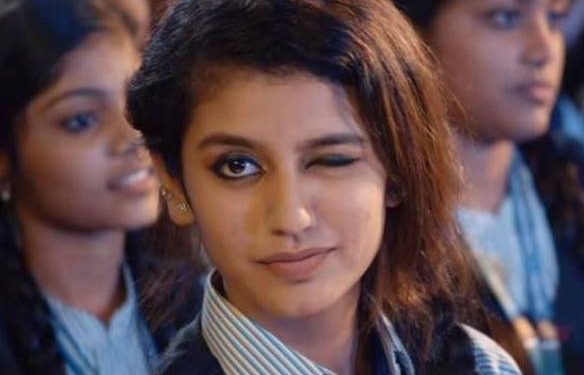New Delhi: The Supreme Court Friday quashed an FIR against actor Priya Prakash Varrier, director and the producer of Malayalam movie ‘Oru Adaar Love’, which alleged that the ‘wink song’ video had hurt the religious sentiments of the Muslim community.
A bench of Chief Justice Dipak Misra and Justices A M Khanwilkar and D Y Chandrachud said the Malayalam folk song, on which the song has been picturised with Varrier, has been in the public domain since 1978 and the song video cannot be termed as blasphemous.
“We allow the writ petition of Varrier and others and quash the FIR lodged against them in Telangana and further direct no FIR or any complaint under Section 200 of CrPC will be entertained against the petitioners for picturization of the song in question,” the bench said.
Referring to a constitution bench judgement and a verdict delivered in a similar case lodged against cricketer M S Dhoni, it said no offence under Section 295 A of the IPC is made out against the 18-year-old actor and others in the present case.
Section 295 A of IPC deals with deliberate and malicious acts, intended to outrage religious feelings or any class by insulting its religion or religious beliefs.
The apex court February 21 stayed criminal proceedings against Varrier in some states, filed on the grounds that a song from her film allegedly hurt the sentiments of the Muslim community.
Varrier, who shot to fame after her ‘wink video’ went viral on internet, is a B.Com student from a college in Kerala’s Thrissur district. She had sought protection from an FIR lodged on complaints alleging that the lyrics of the song ‘Manikya Malaraya Poovi’ from the movie was “offensive” and “violated the religious sentiment of a particular community”.
The actress had moved the apex court seeking quashing of the FIR lodged against her in Telangana and sought the top court’s direction to prohibit states from initiating any criminal proceedings against her.
She had said that the FIR was lodged against her on February 14 at Falaknama police station in Hyderabad on a complaint that alleged that the song hurt the religious sentiment of a community.
On the same day, a criminal complaint was also filed by the Secretary of Raza Academy, Mumbai, with the Commissioner of Police seeking action against the petitioners, taking down the video and preventing it from being broadcast, she had said.
She had said the entire controversy had resulted in the filing of several criminal complaints, while the FIR arose from the lyrics of the song, which is a Mappila song or a traditional number from the Malabar region of Kerala.
Her plea had said the claims that it hurt religious sentiments of Muslims were “without any basis and what is hard to fathom is that a song which has been in existence for the past 40 years, which was written, sung and cherished by the Muslim community in Kerala is now being treated as an insult to the Prophet and his wife.”
“It is submitted that a song, which …. has been cherished by more than one crore Muslim population of Kerala, cannot suddenly offend the religious sentiments of the Muslim community,” it had said.
The plea had stated that criminal complaints and registration of FIRs in multiple states were filed on the basis of complaints by “fringe elements who have misunderstood the lyrics of the song which they claim allegedly offended their religious sentiments and that of their community has adversely affected the petitioners right to life, liberty and freedom of expression under the Constitution.”
The plea had said the movie was then yet to be completed and about Rs. 1.5 crore have been spent on it, but such “flimsy and baseless” complaints and FIRs caused “nothing but hindrance to freedom of speech and expression granted under Article 19(1)(a) of the Constitution” and “an outright abuse” of the legal process.







































